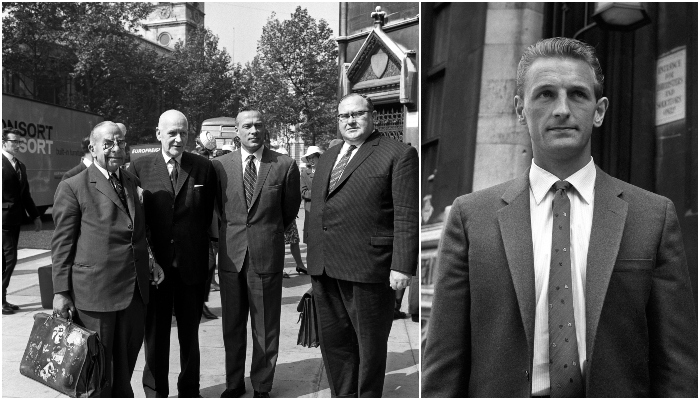LANDMARK JUDGMENTS - Eastham v. Newcastle United Football Club Ltd
Treat a person as he is, and he will remain as he is.
Treat him as he could be, and he will become what he should be.
Treat him as he could be, and he will become what he should be.
- Jimmy Johnson
Facts:
In the context of the Eastham v. Newcastle United Football Club Ltd case, during the early 1960s, English football operated under a system where players were subject to significant restrictions:
1. Player Registration:
- Football Association (FA), the governing body of football in England, mandated that a player had to register with a club association to participate exclusively for that club while under contract.
2. Contract Expiry and Retention:
- When a player's contract with a club expired at the end of the season, the club had the prerogative to retain the player's registration.
- In essence, this meant that even after the contract term had concluded, the club retained control over the player's footballing future, denying them the freedom to explore opportunities with other clubs.
3. Lack of Employment Status:
- Importantly, players who were retained in this manner were not considered employees of the club once their contract lapsed.
- This situation left players without a formal employment contract until they re-signed with the club that held their registration
4. Restriction on Playing for Other Clubs:
- As a direct consequence of this system, retained players were effectively barred from playing for any other club until they reached a new agreement with the club holding their registration.
These facts underscore the fundamental issue at the heart of the Eastham case – the substantial constraints placed on football players' career choices and mobility due to the "retain and transfer" system, which was subsequently challenged and overturned through legal proceedings.
Issue:
The pivotal issue in the case of Eastham v. Newcastle United Football Club Ltd revolved around the plaintiff, a professional football player, challenging the enforceability of his contract with the club and the Football Association's (FA) retention guidelines. Specifically, the plaintiff contended that these contractual arrangements placed unreasonably burdensome trade restrictions on him and potentially violated the law.
The pivotal issue in the case of Eastham v. Newcastle United Football Club Ltd revolved around the plaintiff, a professional football player, challenging the enforceability of his contract with the club and the Football Association's (FA) retention guidelines. Specifically, the plaintiff contended that these contractual arrangements placed unreasonably burdensome trade restrictions on him and potentially violated the law.
The core legal question before the court was whether the "retain and transfer" system, as applied to the plaintiff, unreasonably restricted his freedom to pursue opportunities with other football clubs, and whether such restrictions were legally permissible under the prevailing labor and contract laws. Ultimately, the plaintiff sought a ruling that would render his contract with the club and the FA's retention guidelines unenforceable, thereby allowing him the freedom to transfer to another team of his choice.
The resolution of this issue in favor of the plaintiff set a significant precedent, reshaping the landscape of football contracts and player mobility in England and contributing to a more equitable balance between clubs and players.
Decision:
The Court has duly considered the contentions put forth by the plaintiff in the case of Eastham v. Newcastle United Football Club Ltd. Upon careful examination, it is evident that the retention clauses within the football player's contract indeed imposed unjustifiable restrictions on trade.
The Court has duly considered the contentions put forth by the plaintiff in the case of Eastham v. Newcastle United Football Club Ltd. Upon careful examination, it is evident that the retention clauses within the football player's contract indeed imposed unjustifiable restrictions on trade.
These retention clauses were unique in that they did not stem from the exercising of an option that could have extended the player's employment; instead, they were invoked after the termination of employment. It is crucial to recognize that the player's ability to receive compensation hinged on the re-signing of a contract, effectively rendering the retention notice irrelevant until this point. This scenario presented a clear infringement on the player's rights and a significant impediment to his pursuit of alternative employment opportunities.
The Court finds that the retention clauses, as well as certain transfer clauses, exceeded what could be reasonably expected to protect the interests of the defendant club. These clauses operated to the detriment of the plaintiff, substantially limiting his freedom to engage in his chosen profession.
Therefore, in light of the aforementioned considerations, the Court rules in favor of the plaintiff. The retention clauses, being incompatible with the principles of fair trade and employment rights, are deemed ultra vires and unenforceable. This decision aims to restore the plaintiff's full freedom to seek employment with the football club of his choice, unburdened by unfair contractual constraints.
In reaching this decision, the Court not only upholds the rights of the individual player but also contributes to the broader objective of fostering fairness and equitable treatment within the realm of professional football contracts. This judgment aligns with the evolving standards of player mobility and labor rights, promoting a more balanced and just environment for football professionals.
Citation:
Bosman and Athlete Welfare: The Sports Law Approach, the Social Policy Approach, and the EU Guidelines on Dual Careers
Written by
Nupur Verma
Akshay Singh Rawat


.jpeg)
Comments
Post a Comment